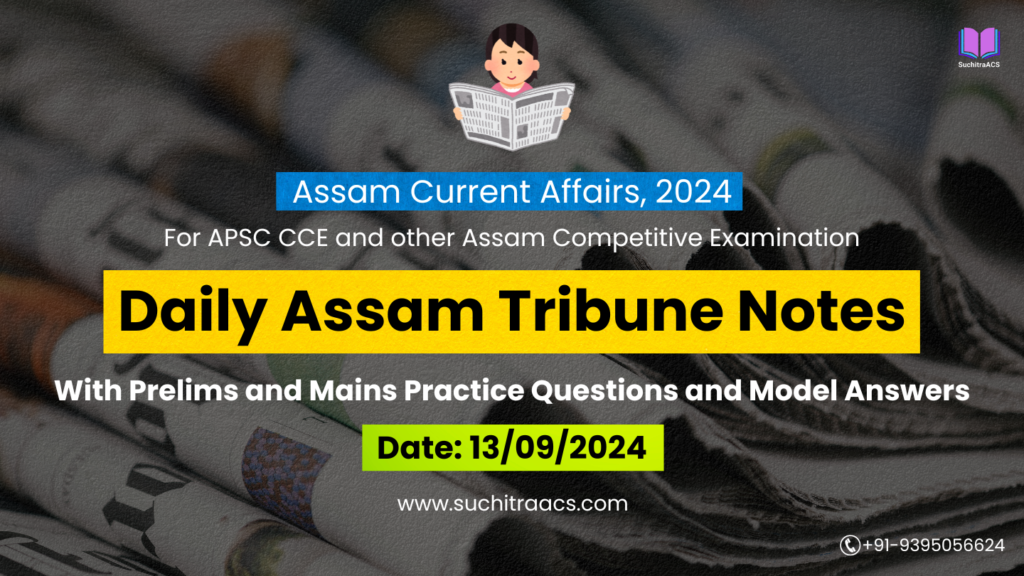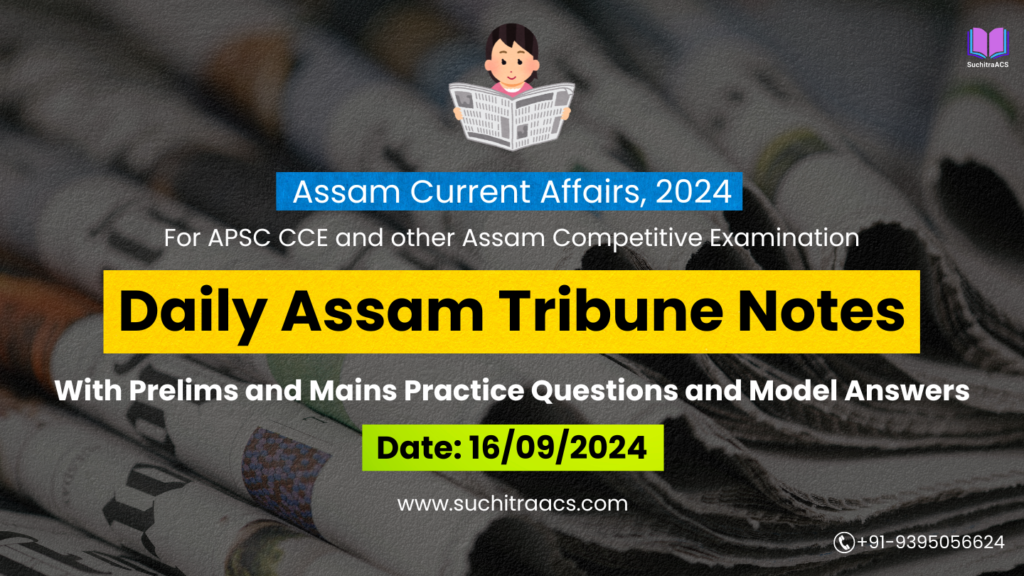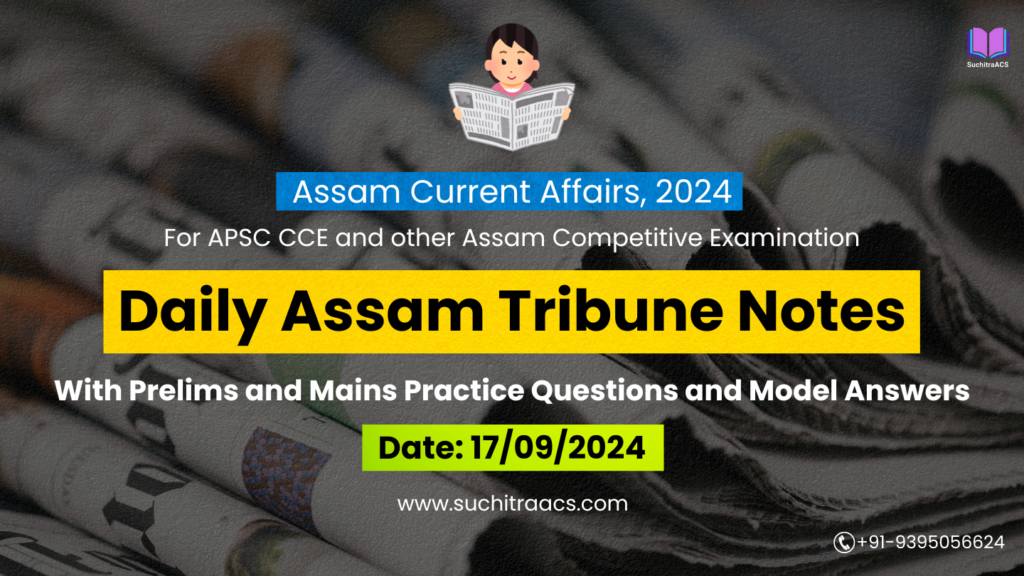I. History, Art, Culture, Literature, Tradition & Heritage of Assam
- Leading Personalities: The newspaper features obituaries of two notable figures:
- Professor Upendranath Sarma: A celebrated scholar and ex-head of the English Department at Cotton College, recognized for his literary contributions as an author, translator, and editor. His association with esteemed cultural organizations like Asam Sahitya Sabha and Assam Academy underscores his significant role in Assam’s literary landscape.
- Dr. Jamaluddin Ahmed: A retired Arabic HoD from Mangaldai College and a former journalist, whose passing is mourned by both the academic and media communities in the district.
II. Geography of Assam
- Natural Resources & Disasters: Two key events highlight the interplay between Assam’s geography and its challenges:
- Sand Gravel Mining Protests: Demonstrations against sand gravel extraction from the Boko river raise alarms about environmental consequences. Concerns include water pollution, declining water levels, and threats to agriculture and biodiversity. This news emphasizes the need for sustainable resource management in the state.
- Drowning Incident: The tragic death of a teenager in the Boko river during a photo outing with friends serves as a reminder of the potential dangers associated with Assam’s water bodies. It underscores the importance of water safety awareness and preparedness.
III. Political and Administrative System of Assam
- Governance & Polity: The newspaper provides insights into various facets of Assam’s political and administrative landscape:
- ASSEB Formation: The establishment of the Assam State School Education Board (ASSEB), merging SEBA and AHSEC, marks a significant step in educational governance. This move aims to centralize and streamline the administration of school education across the state.
- CBI Probe into Scams: The State Cabinet’s decision to transfer 32 online trading scam cases to the CBI demonstrates the government’s commitment to tackling financial fraud and ensuring justice.
- Eviction Drive & Political Allegations: The opposition’s critique of the Sonapur eviction drive and accusations of political motives behind it, along with alleged connections between politicians and the trading scams, highlight the complexities of governance and the challenges of upholding transparency.
- Arrest of Bangladeshi National: The apprehension of a Bangladeshi individual in Hailakandi district who had allegedly procured Indian documents illegally underscores the persistent challenges of border security and illegal immigration in Assam.
IV. Economy of Assam
- Industrial & Economic Development: Several developments shed light on Assam’s economic progress:
- Dassault Systemes Investment: The substantial investment of Rs 200 crore by Dassault Systemes to establish an engineering skills training hub in Assam signals a positive trajectory for industrial and economic growth. This collaboration between the tech giant and the state government is poised to create avenues for skill enhancement and employment in burgeoning sectors such as aviation, defense, and automotive engineering.
- Regularization of Teachers: The State Cabinet’s decision to regularize contractual high school teachers demonstrates a focus on improving education quality and providing job security to educators.
- Expansion of Welfare Schemes: The inclusion of 17 lakh new ration card holders and 12.6 lakh Orunodoi beneficiaries showcases the government’s dedication to expanding social welfare programs and reaching marginalized populations.
- CM Atmanirbhar Asom Abhijan: The disbursement of Rs 2 lakh each to the first batch of beneficiaries under this scheme aims to foster entrepreneurship and self-employment within the state.
- Infrastructure Development: The allocation of funds for a stadium in Kokrajhar and the State Zoo’s beautification reflects the government’s efforts to enhance infrastructure and promote tourism.
- Economic Transparency Concerns: The opposition’s call for a Supreme Court-monitored CBI investigation into the trading scams and apprehensions about the potential misuse of public funds for political gains emphasize the ongoing discourse surrounding economic transparency and accountability in Assam.
V. Bio-diversity, Environment, Security and Disaster Management
- Environment & Security: The newspaper touches upon critical aspects of Assam’s environment and security:
- Rare Beetle Discovery: The identification of a rare dung beetle species in Meghalaya, previously undocumented in India, underscores the region’s rich biodiversity and the imperative for conservation efforts.
- Mining Ban & Environmental Concerns: The temporary prohibition of sand gravel mining in the Boko river due to protests by local villagers highlights the environmental concerns associated with resource extraction and the necessity for sustainable practices.
- Assault on Policewoman: The arrest of two individuals for assaulting an on-duty policewoman in Digboi during a religious procession reflects the challenges of maintaining law and order during large public gatherings.
- ADRE Security Measures: The stringent security arrangements for the ADRE 2024, including market closures and movement restrictions near exam centers, showcase the government’s commitment to ensuring a fair and secure recruitment process.
APSC Prelims Practice Questions
1. History, Art, Culture, Literature, Tradition & Heritage of Assam
- Question: Professor Upendranath Sarma, whose obituary was featured in the Assam Tribune, was conferred the title ‘Sahityacharya’ in which year?
- (A) 2014
- (B) 2017
- (C) 2021
- (D) 2023
- Answer: (B)
2. Geography of Assam
- Question: The protests against sand gravel mining in the river Boko primarily focused on concerns related to:
- (A) Increased water levels and flooding
- (B) Environmental degradation and water pollution
- (C) Conflicts with Meghalaya over resource rights
- (D) Loss of livelihood for local fishermen
- Answer: (B)
3. Political and Administrative System of Assam
- Question: The Assam State School Education Board (ASSEB) was formed by merging which two existing educational bodies?
- (A) SEBA and AHSEC
- (B) SCERT and SSA
- (C) RMSA and RUSA
- (D) DIET and NCTE
- Answer: (A)
4. Economy of Assam
- Question: The first batch of beneficiaries under the CM Atmanirbhar Asom Abhijan will receive how much financial assistance each?
- (A) Rs. 50,000
- (B) Rs. 1 lakh
- (C) Rs. 2 lakhs
- (D) Rs. 5 lakhs
- Answer: (C)
5. Bio-diversity, Environment, Security and Disaster Management
- Question: The news article about the rare dung beetle discovery in Meghalaya highlights its significance in:
- (A) Pest control and disease prevention
- (B) Soil fertility and secondary seed dispersal
- (C) Increasing agricultural yield
- (D) Attracting tourists to the region
- Answer: (B)
APSC Mains Practice Question
Question:
Critically analyze the recent eviction drive in Sonapur, Assam, in light of the principles of good governance and social justice. Discuss the challenges faced by the administration in balancing the need for development with the rights of vulnerable communities. (250 words)
Model Answer:
The recent eviction drive in Sonapur, Assam, aimed at clearing tribal land from illegal settlers, has sparked a debate on the delicate balance between development imperatives and the rights of vulnerable communities. While the drive aligns with the government’s objective of protecting tribal land rights and preventing encroachment, its execution has raised concerns about adherence to good governance principles and social justice.
Good Governance and Social Justice Concerns:
- Lack of Adequate Notice and Rehabilitation: The eviction drive has been criticized for its alleged lack of prior notice and proper rehabilitation arrangements for the displaced people. This raises questions about the government’s commitment to ensuring procedural fairness and protecting the basic human rights of those affected.
- Disproportionate Use of Force: The clashes between the police and alleged encroachers, resulting in casualties and injuries, have fueled concerns about the use of excessive force during the eviction. This underscores the need for the administration to adopt a more humane and sensitive approach, prioritizing dialogue and peaceful resolution over confrontation.
- Political Motivations and Diversionary Tactics: The opposition’s allegations of political conspiracy and the use of the eviction drive as a diversionary tactic from the ongoing trading scams raise concerns about the transparency and accountability of the government’s actions. This highlights the importance of maintaining public trust and ensuring that development initiatives are not perceived as tools for political maneuvering.
Challenges Faced by the Administration:
- Balancing Development and Rights: The administration faces the complex challenge of balancing the need for development and infrastructure projects with the protection of the rights and livelihoods of vulnerable communities, particularly those residing in tribal belts and blocks.
- Addressing Encroachment and Illegal Settlement: The issue of encroachment on tribal land and illegal settlement poses a significant challenge to the administration. It requires a multi-pronged approach that includes effective land management policies, strict enforcement of laws, and addressing the root causes of encroachment, such as poverty and landlessness.
- Ensuring Transparency and Accountability: Maintaining transparency and accountability in development initiatives, particularly those involving land acquisition and displacement, is crucial for building public trust and ensuring social justice. The administration must proactively address concerns about corruption and political interference to ensure that development benefits reach the intended beneficiaries.
Conclusion:
The Sonapur eviction drive serves as a stark reminder of the complexities involved in balancing development goals with the rights of vulnerable communities. While the government’s intent to protect tribal land rights is commendable, it is imperative that such initiatives are carried out in a manner that upholds the principles of good governance, social justice, and human rights. The administration must prioritize transparency, accountability, and a humane approach to ensure that development does not come at the cost of social harmony and the well-being of marginalized communities.
✨ Looking for top-quality APSC online coaching at an affordable price?

📚Want to know more about SuchitraACS’s most affordable courses?
Click here to know more: SuchitraACS Courses for APSC CCE and Assam Competitive Examinations
🔔 Join Our WhatsApp Study Group!
For exclusive access to premium quality content, including study materials, current affairs, MCQs, and model answers for APSC CCE and other Assam competitive exams.
Click here to join: SuchitraACS Study WhatsApp Group




